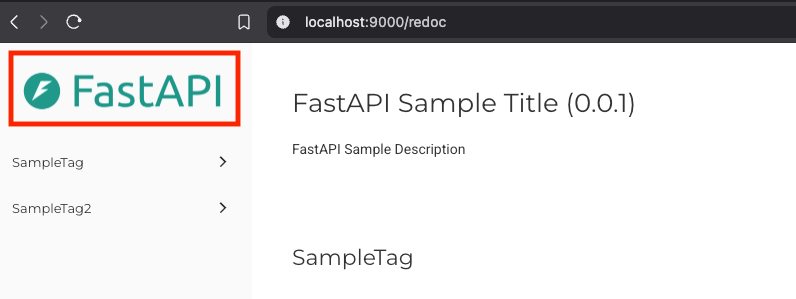FastAPIから出力されるOpenAPIをyamlにしたい
はじめに
FastAPI は python の Web フレームワークです。そして API のインターフェイスを python のコードで記述すれば、API の仕様書を OpenAPI 形式で出力できるという、とても便利な機能を持っています。
しかし標準機能では json 形式の出力のみで、yaml 形式の出力は備わっていません。yaml の方が読みやすくて好きなのでこれは困ります。
この記事では、そんな方向けに yaml で出力する方法を紹介します。また、それ以外にもクライアント側のコード生成を行うにあたって微妙に困ることがあるので、その解決方法も紹介します。
サンプルコードは以下のリポジトリに公開しています。
yaml 形式での出力
以下のようなコードを追加すると、/openapi.yaml に GET すれば yaml 形式で出力されるようになります。
from fastapi import FastAPI, Response
from functools import lru_cache
import yaml
from yamlcore import CoreDumper
def set_openapi_yaml(app: FastAPI) -> None:
@lru_cache()
def read_openapi_yaml() -> Response:
openapi_json = app.openapi()
yaml_s = yaml.dump(openapi_json, Dumper=CoreDumper)
return Response(yaml_s, media_type="text/yaml")
app.add_api_route(
"/openapi.yaml",
read_openapi_yaml,
methods=["GET"],
include_in_schema=False,
)
include_in_schema を False にしているため、このルートは openapi の仕様書に出力されません。FastAPI オブジェクトを set_openapi_yaml に渡すとこの機能がセットされます。
app = FastAPI()
set_openapi_yaml(app)
Query パラメータのスキーマが出力されない
Query パラメーターは pydantic の Model (以下の例だと SampleQuery) として定義して以下のように書くことができます。
from pydantic import BaseModel
class SampleQuery(BaseModel):
q_str: str
q_int: int
from typing import Annotated
from fastapi import Query
@router.get("/")
async def get_sample(query: Annotated[SampleQuery, Query()]):
pass

しかしこのままでは OpenAPI のスキーマには SampleQuery が出力されません。これはコード生成するときに不便です。
そんな時は以下のようにして解決できます。
def query_schema(query_cls: type[BaseModel]) -> tuple[str, dict[str, Any]]:
schema = query_cls.model_json_schema(
ref_template="#/components/schemas/{model}"
)
# 余計なので削除
del schema["$defs"]
# default null なのに key があると optional にならないのでここで削除
for value in schema["properties"].values():
if "default" in value.keys() and value["default"] is None:
del value["default"]
return query_cls.__name__, schema
def set_custom_openapi(app: FastAPI) -> None:
def custom_openapi():
if app.openapi_schema:
return app.openapi_schema
openapi_schema = get_openapi(
title=app.title,
version=app.version,
openapi_version=app.openapi_version,
summary=app.summary,
description=app.description,
terms_of_service=app.terms_of_service,
contact=app.contact,
license_info=app.license_info,
routes=app.routes,
webhooks=app.webhooks.routes,
tags=app.openapi_tags,
servers=app.servers,
separate_input_output_schemas=app.separate_input_output_schemas,
)
# query parameter は schema に追加されないのでここで追加
queires: list[type[BaseModel]] = [SampleQuery]
for query in queires:
q_name, q_schema = query_schema(query)
openapi_schema["components"]["schemas"][q_name] = q_schema
return openapi_schema
app = FastAPI()
set_custom_openapi(app)
すると無事 OpenAPI のスキーマに追加されます。

Enum のスキーマのカスタマイズ
enum の定義に x-enum-varnames を加えるとクライアントのコード生成時に enum で生成してくれます。
PetType:
type: string
enum:
- 猫
- 犬
x-enum-varnames:
- Cat
- Dog
以下のように CustomSchemaEnum を定義して、それを継承すると x-enum-varnames が出力されます。
from pydantic_core import core_schema as cs
from pydantic import GetJsonSchemaHandler
from pydantic.json_schema import JsonSchemaValue
from enum import Enum
class CustomSchemaEnum(Enum):
@classmethod
def get_names(cls):
return [e.name for e in cls]
@classmethod
def __get_pydantic_json_schema__(
cls, core_schema: cs.CoreSchema, handler: GetJsonSchemaHandler
) -> JsonSchemaValue:
json_schema = handler(core_schema)
json_schema = handler.resolve_ref_schema(json_schema)
json_schema["x-enum-varnames"] = cls.get_names()
return json_schema
class PetType(str, CustomSchemaEnum):
Cat = "猫"
Dog = "犬"
Redoc のカスタマイズ
ReDoc (デモサイト) は、OpenAPI の仕様書をベースに整った API ドキュメントを生成するドキュメントジェネレーターです。
FastAPI に標準機能として備わっており、サーバーを起動して /redoc にアクセスすれば利用できます。
基本的なカスタマイズ
カスタマイズするには、以下の FastAPI の redoc の html を生成する関数をコピーして中身を変更します。
ReDoc は <redoc> タグの属性に色々指定して設定を変更できるようです。
<redoc> タグの部分だけ抜粋して、たとえば以下のように変更します。面倒なのでハードコーディングしていますが、それで十分でしょう。
def get_redoc_html(
openapi_url: str = "/openapi.json",
theme: dict = None,
) -> HTMLResponse:
...省略...
""""
<redoc
spec-url="{openapi_url}"
disable-search="true"
hide-download-button="true"
"""
if theme is not None:
html += f"""
theme='{json.dumps(theme)}'
"""
html += """
></redoc>
"""
...省略...
指定できるパラメーターは以下のリンクから確認できます。
そして以下のような関数を用意し設定します。
def set_custom_redoc(app: FastAPI) -> None:
def redoc_html():
return get_redoc_html(
openapi_url=app.openapi_url,
title=app.title,
theme={"sidebar": {"backgroundColor": "lightblue"}},
)
app.add_api_route(
"/redoc",
redoc_html,
methods=["GET"],
include_in_schema=False,
)
redoc_url=None とすることで標準の Redoc が無効になり、カスタマイズした redoc を設定できます。
app = FastAPI(redoc_url=None)
set_custom_redoc(app)
Redoc のロゴ

Redoc のロゴは openapi.yaml の info.x-logo.url にロゴの URL 指定することで変更できます。
info:
x-logo:
url: https://fastapi.tiangolo.com/img/logo-margin/logo-teal.png
そのためには FastAPI オブジェクトの openapi メソッドをオーバーライドすれば良いです。
def set_custom_openapi(app: FastAPI) -> None:
def custom_openapi():
if app.openapi_schema:
return app.openapi_schema
openapi_schema = get_openapi(
title=app.title,
version=app.version,
openapi_version=app.openapi_version,
summary=app.summary,
description=app.description,
terms_of_service=app.terms_of_service,
contact=app.contact,
license_info=app.license_info,
routes=app.routes,
webhooks=app.webhooks.routes,
tags=app.openapi_tags,
servers=app.servers,
separate_input_output_schemas=app.separate_input_output_schemas,
)
openapi_schema["info"]["x-logo"] = {
"url": "https://fastapi.tiangolo.com/img/logo-margin/logo-teal.png"
}
app.openapi = custom_openapi
Swagger UI のカスタマイズ
Swagger UI (デモサイト) は OpenAPI の仕様書をもとに REST API の仕様を可視化し、インタラクティブに操作できるウェブベースのユーザーインターフェースです。
FastAPI の標準機能として備わっており、サーバーを起動して /docs にアクセスすれば利用できます。仕様の確認だけでなく API のテストもできるのでとても便利です。
カスタマイズしたことない (必要性を感じない) のでわかりませんが、ReDoc と同様に以下の関数をコピーして変更すれば良いと思われます。
Discussion